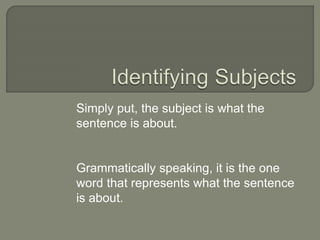
Identifying subjects
- 1. Simply put, the subject is what the sentence is about. Grammatically speaking, it is the one word that represents what the sentence is about.
- 2. The subject usually comes before the verb. Gwendolyn was late for class. This sentence is about Gwendolyn
- 3. The subject could be a verb form that is acting as a noun in the sentence Learning can be challenging (Learning is the subject) To be grateful is an important quality. (To be is the subject)
- 4. The subject may be a pronoun Everyone is going to the dance. (Everyone is the subject) We need to shut the lights off. (We is the subject)
- 5. The subject will never be in a prepositional phrase Everyone in the class is going home. Several of the books are missing.
- 6. The subject will come after the verb in an inverted sentence that begins with “here” or “there” Here lies a man of great character. This sentence is about a man of great character who lies here.
- 7. To identify the subject in a sentence that begins with “here” or “there,” look for the first noun after the verb. There exists no reason to fear the dark. If you reverse the order, the subject would become obvious No reason exists to fear the dark.
- 8. Sentences may have more than one subject – also known as a compound subject, as in: Fred and Ethel were Lucy and Ricky’s best friends. Fred and Ethel have equal billing in this sentence and are both the subject.